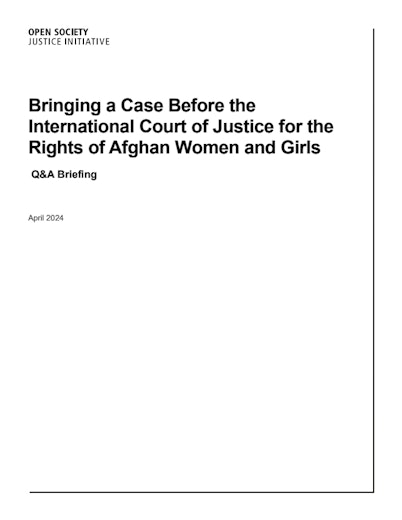German and Belgian Prosecutors Urged to Investigate Chemical Shipments to Syria
NEW YORK—Prosecutors in Belgium and Germany are being asked to open a criminal investigation into the role of three European companies in a 2014 shipment to Syria of material that can be used to produce chemical weapons.
Three groups working on accountability for atrocity crimes—Syrian Archive, the Open Society Justice Initiative, and TRIAL International—have filed criminal complaints with prosecutors in Antwerp, Hamburg and Essen.
The complaints cite export documents and investigative work indicating that the three companies—BASF Antwerpen NV, Sasol Germany GmbH, and Brenntag AG and its Swiss subsidiary—may have been involved in the shipping of quantities of the chemicals isopropanol and diethylamine, that were delivered to Syria via Switzerland in 2014.
Both products are used in the production of pharmaceuticals. But isopropanol can also be used in the production of sarin, a deadly chemical agent that has been used by the Syrian government against civilians. Diethylamine is also used in the production of VX, a highly toxic nerve agent that has been found in Syria’s chemical weapons stockpiles.
At the time, both chemicals were on a list of restricted dual-use materials under European Union sanctions that required prior approval for export directly or indirectly to Syria. The EU’s sanction regime also applies to the actions of EU citizens outside the EU’s territory.
The complaints note that the relevant Belgian export agency stated that it did not receive any authorization requests for the export of diethylamine from Belgium with Syria as final destination, and the German export agency said they did not provide authorization for any such shipments during the period in question.
Details of the isopropanol shipment from Switzerland were first reported in Switzerland last year, with the State Secretariat for Economic Affairs (SECO) saying in April 2018 that the shipment was legal under Swiss law. SECO added that the client was “a private Syrian pharmaceutical firm” and that there was “no indication that it had links to the Syrian government at the time, nor today.”
Subsequently, three Swiss newspapers, Le Matin Dimanche, Sonntagszeitung, and Tribune de Genève, reported further details of the sales, including that the customer was Mediterranean Pharmaceutical Industries (MPI), a Syrian company with close links to the Syrian government.
MPI was licensed to manufacture Voltaren, an over-the-counter anti-inflammatory that uses the two chemicals, by a subsidiary of Novartis, the Swiss pharmaceutical company.
All of the companies say their actions were in accordance with existing sanctions regulations. Novartis in particular states that the due diligence they conducted on MPI “indicated no red flags.”
Yet the investigation by the three NGOs shows that, in 2014, MPI was headed by Abdul Rahman Attar, now deceased, who was a prominent Syrian businessman with close ties to senior figures in the Syrian government. At the time of the export, it was known that Attar was suspected of attempting to facilitate evasion of U.S. sanctions.
The United Nations launched its investigation on the possible use of chemical weapons in Syria in April 2013, after first reports of chemical weapons use appeared in December 2012.
The shipment of 5,000 kg of Isopropanol came after the Organization for the Prohibition of Chemical Weapons announced in May 2014 that Syria had destroyed its stock of 120 metric tons of isopropanol.
In April 2017, nearly 100 people were killed and more than 200 injured in a chemical attack at Khan Shaykun using sarin produced with isopropanol.
Related Work
Reported 2014 Chemical Shipments to Syria Raise Questions over EU Sanctions
Three groups are questioning the failure of European Union sanctions to prevent the reported shipment to Syria in 2014 of chemicals that can be used to produce sarin and VX gas.
Open Society Justice Initiative Welcomes German Arrests of Syrian Atrocity Crime Suspects
The Justice Initiative has been working with the Commission for International Justice and Accountability to build a case dossier against one of the men arrested, who is a former senior Syrian intelligence official.
Q&A: Bringing a Case Before the International Court of Justice for the Rights of Afghan Women and Girls
This paper considers 21 questions around the feasibility of bringing a complaint at the International Court of Justice against Afghanistan's Taliban for egregious and prevalent violations of women’s and girls’ rights.
